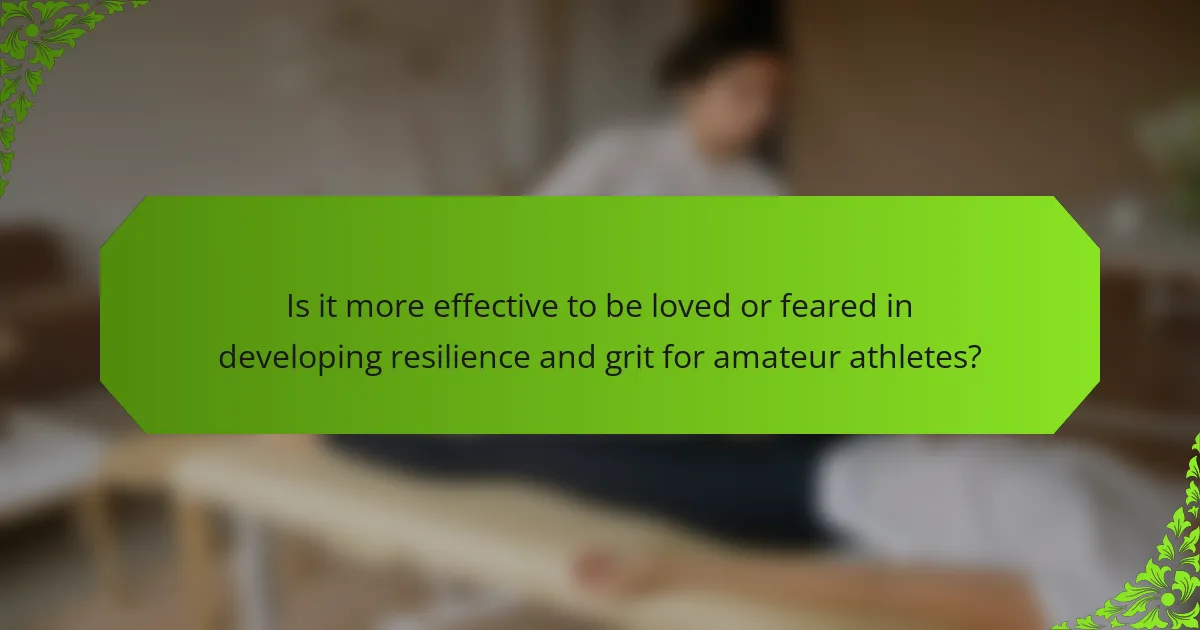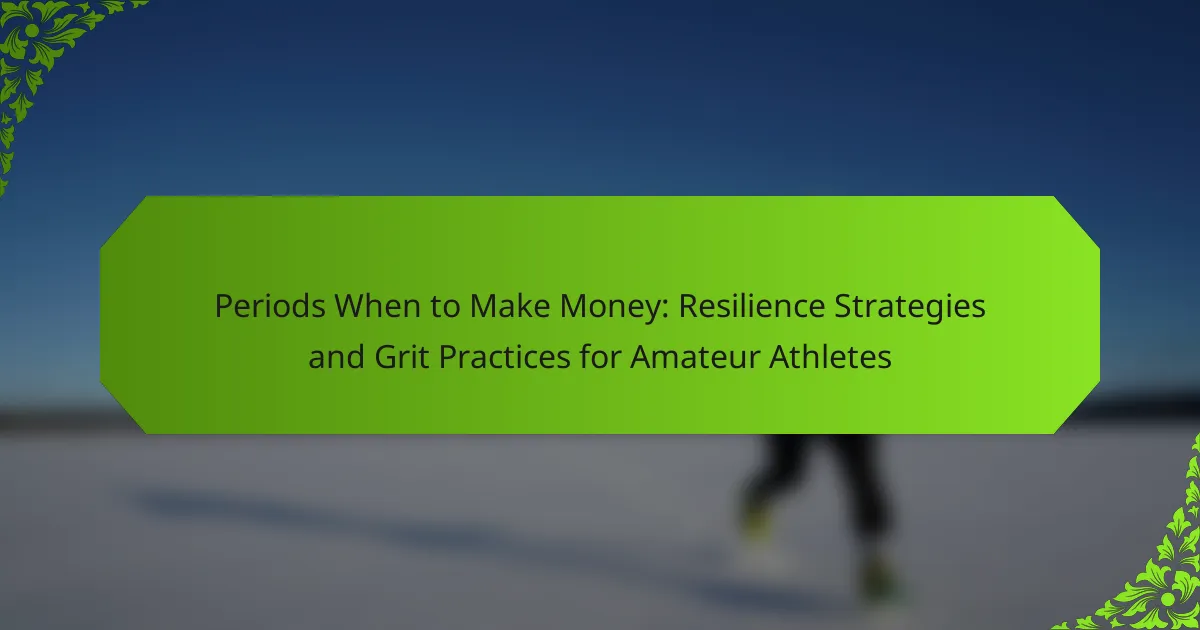Building resilience and grit is crucial for athletes aiming for long-term success. This article explores how being loved fosters a supportive environment that enhances mental toughness. It contrasts positive reinforcement with fear-based approaches, highlighting their impact on motivation and personal growth. Ultimately, creating a culture of support proves more effective for sustained athletic development.

Is it more effective to be loved or feared in developing resilience and grit for amateur athletes?
Being loved is generally more effective than being feared in developing resilience and grit for amateur athletes. Positive reinforcement fosters a supportive environment, encouraging athletes to embrace challenges. Studies show that athletes who feel valued are more likely to persist through adversity.
Fear-based approaches can lead to anxiety and reduced motivation, undermining long-term development. For example, a coach who builds trust and rapport can instill confidence, promoting resilience. In contrast, a fear-driven strategy may yield short-term compliance but ultimately hinders grit and personal growth.
Creating a culture of support enhances not just performance but also mental toughness. Athletes thrive in environments where they feel loved, leading to sustained effort and resilience.
What are the foundational principles of resilience and grit?
To build resilience and grit, it is better to be loved than feared. Love fosters a supportive environment, encouraging athletes to take risks and learn from failure. Resilience thrives on positive reinforcement, while fear can stifle growth and creativity. Studies show that athletes who experience supportive relationships exhibit higher levels of perseverance and motivation. In contrast, a fear-based approach can lead to anxiety and decreased performance. Ultimately, love cultivates a mindset conducive to resilience and grit, empowering athletes to overcome challenges.
How do love and fear influence an athlete’s mindset?
Love fosters a supportive environment, while fear can create pressure. Both emotions significantly influence an athlete’s mindset. Love enhances motivation and resilience, promoting a sense of belonging. Fear, on the other hand, can drive performance but may lead to anxiety and burnout. Research shows athletes thrive in environments where they feel valued and encouraged; balancing love and fear is crucial for developing grit.
What psychological mechanisms are at play?
Both love and fear can influence resilience and grit in athletes, but love generally fosters a more sustainable environment for growth. Psychological mechanisms such as attachment theory highlight that supportive relationships enhance motivation and emotional stability. Conversely, fear can drive performance temporarily but may lead to anxiety and burnout over time. Research indicates that athletes who perceive their coaches as supportive are more likely to exhibit resilience and grit during challenges. This suggests that fostering a loving environment is crucial for long-term success in sports.
What are the universal attributes of resilience in sports?
Resilience in sports encompasses adaptability, mental toughness, emotional regulation, social support, and persistence. These attributes collectively enhance an athlete’s ability to cope with challenges. Adaptability allows athletes to adjust strategies in response to changing conditions. Mental toughness enables them to maintain focus and determination under pressure. Emotional regulation helps manage stress and anxiety effectively. Social support fosters a sense of belonging and motivation. Persistence drives athletes to overcome setbacks and continue striving for their goals.
How does emotional support contribute to resilience?
Emotional support significantly enhances resilience by providing athletes with a sense of belonging and encouragement. This support fosters mental strength, enabling athletes to cope with challenges. Studies show that athletes with strong emotional support networks demonstrate greater grit and perseverance. Emotional connections can mitigate stress, promoting a positive mindset crucial for performance and recovery.
What role does motivation play in grit?
Motivation is essential in developing grit, as it fuels persistence and resilience in athletes. A strong intrinsic motivation encourages athletes to overcome challenges and maintain focus on long-term goals. Research indicates that motivated athletes exhibit higher levels of grit, leading to improved performance and mental toughness. As motivation strengthens, it enhances the ability to endure setbacks and fosters a growth mindset, which is crucial for building resilience.
What unique traits distinguish successful amateur athletes?
Successful amateur athletes often possess unique traits such as resilience, adaptability, and a strong work ethic. These qualities enable them to overcome challenges and maintain motivation. Resilience allows athletes to bounce back from setbacks, while adaptability helps them adjust strategies based on performance feedback. A strong work ethic drives consistent training and improvement, distinguishing them from less committed peers. These traits collectively enhance their competitive edge and foster long-term success in their athletic pursuits.
How do personal values shape resilience and grit?
Personal values significantly influence resilience and grit in athletes. Values such as perseverance, integrity, and teamwork foster a strong mental framework, enabling athletes to overcome challenges. Resilience is often rooted in personal beliefs, guiding athletes through adversity. Grit, defined as passion and sustained effort, is enhanced when aligned with core values, motivating athletes to pursue long-term goals despite setbacks. Studies show that athletes who prioritize personal values demonstrate higher resilience and grit, ultimately leading to better performance outcomes.
What impact does community support have?
Community support significantly enhances resilience and grit in athletes. It fosters a sense of belonging and motivation, encouraging individuals to push beyond their limits. Studies show that athletes with strong community backing experience improved performance and mental well-being. Additionally, supportive environments can lead to higher levels of commitment and perseverance, critical for overcoming challenges in sports.
What rare attributes can enhance resilience and grit?
Resilience and grit in athletes can be enhanced by cultivating rare attributes like adaptability, emotional intelligence, and intrinsic motivation. Adaptability allows athletes to adjust strategies in response to challenges, fostering resilience. Emotional intelligence helps in managing stress and understanding team dynamics, which strengthens grit. Intrinsic motivation drives athletes to pursue excellence for personal satisfaction rather than external rewards, reinforcing their commitment. These attributes create a robust foundation for enduring challenges in sports.
How does vulnerability contribute to growth?
Vulnerability fosters growth by encouraging athletes to confront challenges and develop resilience. Embracing vulnerability allows athletes to acknowledge their weaknesses, leading to improved grit and perseverance. This self-awareness cultivates a growth mindset, essential for overcoming obstacles in sports. Studies show that athletes who embrace vulnerability often experience greater emotional strength and adaptability, enhancing their performance and mental health.
What is the significance of self-compassion?
Self-compassion is crucial for athletes as it fosters resilience and grit. It allows them to acknowledge failures without harsh self-criticism, promoting a growth mindset. Research shows self-compassionate athletes recover faster from setbacks, enhancing their overall performance. By cultivating self-kindness, athletes build emotional strength and sustain motivation, which are essential for long-term success in sports.
How can amateur athletes balance love and fear in training?
Amateur athletes can balance love and fear in training by fostering a supportive environment while confronting challenges. Building resilience requires the encouragement of coaches and teammates, which nurtures confidence. Simultaneously, facing fears in training pushes athletes to grow. Research indicates that emotional support enhances performance, while exposure to adversity builds grit. Finding the right balance between these elements can lead to improved mental toughness and overall success in sports.
What strategies promote a supportive environment?
To promote a supportive environment for athletes, prioritize love over fear. This approach fosters resilience and grit. Strategies include open communication, positive reinforcement, and team-building activities. These elements create trust, enhance motivation, and improve performance. As a result, athletes feel valued and empowered to face challenges.
How can constructive criticism be effectively delivered?
Effective delivery of constructive criticism involves clarity, timing, and empathy. Start with specific observations rather than generalizations. Use “I” statements to express personal feelings about the behavior, which fosters a non-defensive environment. Ensure the timing is appropriate; deliver feedback soon after the event but allow for emotional cooling if needed. Focus on the behavior, not the person, to maintain respect and encourage growth. Lastly, invite dialogue by asking for the recipient’s perspective, promoting a collaborative approach to improvement.
What are common mistakes in fostering resilience and grit?
Common mistakes in fostering resilience and grit include overemphasis on fear, neglecting emotional support, and unrealistic expectations. Athletes often struggle when coaches prioritize discipline over understanding individual needs. A balanced approach that incorporates love and support fosters a healthier environment for developing resilience. Encouraging open communication can also prevent misunderstandings and build trust, essential for grit.
What best practices can athletes implement immediately?
Athletes can implement several best practices to build resilience and grit immediately. Focus on setting specific, achievable goals to create a sense of purpose. Cultivate a growth mindset by viewing challenges as opportunities for learning. Engage in regular self-reflection to assess progress and adjust strategies. Establish a support network for encouragement and accountability. Prioritise physical and mental recovery techniques to maintain overall well-being.


